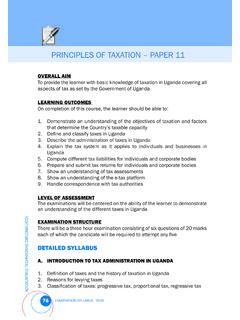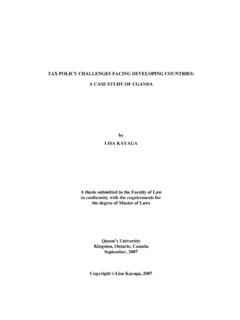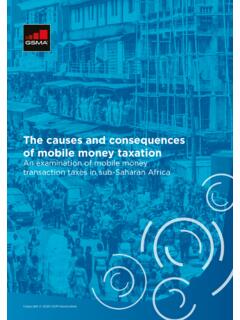Transcription of TAX SYSTEM - ZAMBIA
1 1 TAX SYSTEM The Ministry of Finance and National Planning is responsible for the formulation of tax policy, in ZAMBIA and the implementing agency is the ZAMBIA Revenue Authority (ZRA). The legislative framework relating to the regulation and administration of the taxation is provided for in the Income Tax Act 1966, as amended. The source of income and residence are the basis for liability to tax under the Zambian tax regime. The Income Tax Act requires every person (embracing every business entity, enterprise or individual) receiving income liable to tax under the Act to notify the ZRA, in writing, accordingly within thirty (30) days from the date of first receiving such income and the Act also provides for penalties for failure to give the necessary notice.
2 The tax year (charge year) runs from 1st April to 31st March of the following year. Taxpayers are generally expected to adopt the 31st March as the accounting date and ZRA s prior approval is required if the taxpayer proposes to adopt a different accounting date. Any change in the accounting date also requires prior approval from ZRA. The ZRA requires that annual tax returns including accounts and supporting schedules are submitted on or before 30th September in respect of the tax year ended 31st March of the same calendar year.
3 There are penalties for late submission of tax returns on or before the stipulated date. The principal taxes include direct taxes (notably corporate tax, Pay-As-You-Earn, other personal income), Customs and Excise duties, Value Added Tax (VAT), property transfer tax and mineral royalty (Mines and Minerals Act 1995). Corporate Tax The ZAMBIA Revenue Authority levies corporate tax at the rate of 35%. However, income from the agricultural sector and non-traditional exports (all exports except copper and cobalt) is levied at 15%, while companies listed on the Lusaka Stock Exchange are taxed at the rate of 33%.
4 Banks with income in excess of K250 million are levied corporate tax at the rate of 40%. Personal Income Tax Personal income tax is levied in the range of 25-35%. The maximum rate applicable to farmers is 15%. 2 Employers are required to register and operate a Pay-As-You-Earn (PAYE) scheme under which they are required to deduct the appropriate tax from the emoluments of liable employees and remit the tax to the ZAMBIA Revenue Authority. The employer is under a legal obligation to deduct such tax and remit it to ZRA.
5 Emoluments paid or payable to an expatriate employee for work performed, carried out or for services rendered in respect of his employment in ZAMBIA are liable to tax and should be subjected to deduction of PAYE, notwithstanding the fact that such emoluments are paid or payable outside ZAMBIA or are paid or payable by a person who is resident outside ZAMBIA . Employers are further required to submit annual PAYE tax returns, at the end of every charge year, on a prescribed ZRA form.
6 Value Added Tax (VAT) VAT is levied at 16%. Some specified goods and services are zero-rated or exempt. Registration for VAT purposes is mandatory for every dealer in or supplier of standard rated and zero-rated goods and services, as defined in the VAT Act No. 4 of 1995 (which replaced sales tax), whose taxable turnover exceeds K200 million per annum. Voluntary registration is acceptable for dealers whose turnover falls below the stipulated minimum turnover.
7 Registered suppliers or dealers are required to submit VAT returns monthly within 21 days of the prescribed accounting period unless they have been allowed the option for extended tax period. Late or failure to submit returns, including nil returns, attracts penalties. Input VAT can be claimed within a period of three years from the date of the tax invoice or other documentary evidence. The period within which input VAT, incurred prior to the date of registration for VAT purposes, can be claimed is three months.
8 Double taxation Agreements Some eligible taxpayers find themselves liable to tax in more than one country or territory in respect of the same income. The predicament of international Double taxation may adversely affect the international flow and mobility of human, financial and investment resources, thus the international community has devised a mechanism to prevent, eliminate or mitigate the incidence of Double taxation . 3 The countries that ZAMBIA has signed Double taxation Agreements with include Canada, Denmark, Finland, France, Germany, Holland, India, Ireland, Italy, Japan, Kenya, Mauritius, Norway, Romania, South Africa, Sweden, Tanzania, uganda , United Kingdom, Yugoslavia and Zimbabwe.
9 In principle, double taxation agreements enable offsetting tax paid in one of 2 countries against the tax payable in the other, in this way preventing double taxation . CUSTOMS DUTY There are three categories for import duties: 25% mainly for finished products 15% intermediate goods 0 5% raw materials and capital goods






